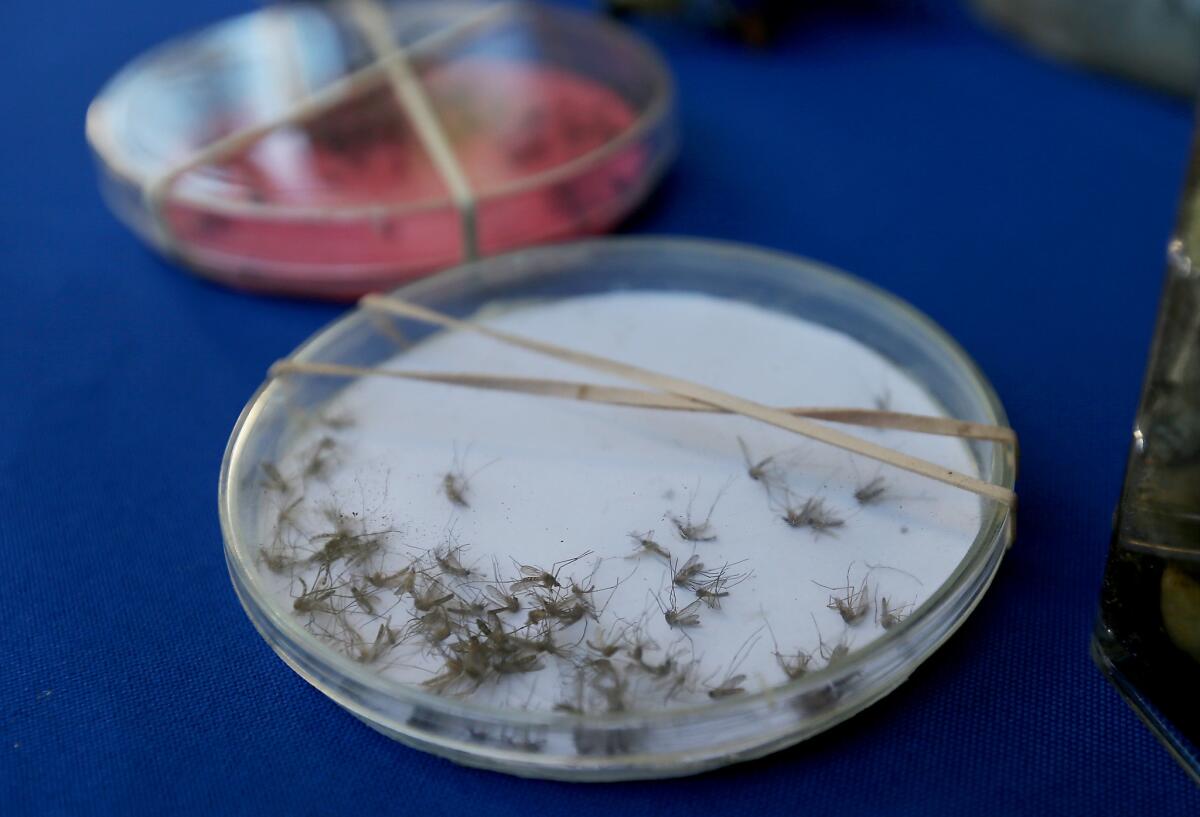Several more possible Zika cases in L.A. County

Los Angeles County health officials said some patient specimens from possible cases of the mosquito-born Zika virus have been sent to the U.S. Centers for Disease Control and Prevention for testing.
- Share via
Though there’s only one confirmed case of Zika virus in Los Angeles County, several more people who might be infected are being tested for the illness, public health officials said Wednesday.
The L.A. County Department of Public Health has received numerous reports from physicians of possible Zika cases, and officials have sent a number of patient specimens to the U.S. Centers for Disease Control and Prevention for testing, said Dr. Jeffrey Gunzenhauser, the county’s interim health officer. He said that fewer than 20 samples had been sent to the CDC.
So far, there have been no cases of Zika virus — a mosquito-borne illness that is linked to serious brain defects in newborns — that were acquired through mosquitoes in the United States.
The single confirmed L.A. County case was in a young girl who traveled to El Salvador in November. California officials said earlier this week that there have been six cases of Zika infections in the last three years, all in people who visited countries with outbreaks.
Zika is transmitted when a mosquito bites someone who has been recently infected, and then bites another person. The infection doesn’t have symptoms in as many as 80% of people.
But public health officials became worried about the virus when cases of microcephaly, a condition in which a baby’s head is unusually small, skyrocketed in Brazil after a Zika outbreak began there last year. The virus has been rapidly spreading, and cases have since been reported in more than 20 countries in the Americas.
On Monday, the World Health Organization declared the spread of Zika virus an international public health emergency.
There have been some cases that appear to have been transmitted through sex. Guzenhauser said the health department’s focus remains on mosquitoes as the main way people are becoming infected.
But, he added, if someone traveled to a country with an outbreak and thinks they could have been infected, they should use a condom to prevent possible transmission.
The most important thing people can do in L.A. County, however, is to stay away from mosquitoes.
The mosquitoes that transmit the virus are not native to California, but have been found here in the last few years. They’ve been detected in 12 of the state’s 58 counties, officials say.
The Asian tiger and the yellow fever mosquitoes — Aedes albopictus and Aedes aegypti, respectively — are about half the size of normal mosquitoes and have black-and-white stripes. Unlike mosquitoes more common to California, which usually come out in the evening, these mosquitoes bite during the daytime.
“They will follow you indoors,” Gunzenhauser said. “They’re very aggressive.”
In L.A. County, they’re largely concentrated in the San Gabriel Valley. Gunzenhauser said Wednesday that late last year, there were several reports of patients with red welts, most likely caused by bites from these mosquitoes.
See more of our top stories on Facebook >>
The insects need water to breed, but can do so in pools as small as that collected in a bottle cap, or in droplets of water stuck between leaves of plants. Officials said that people should inspect their backyards, and clear out any place where there is standing water.
“This is the only way we will be able to combat and defeat” these insects, said Truc Dever, general manager of the Greater Los Angeles County Vector Control District.
Infestations can be reported to the Greater Los Angeles County Vector Control District, which can also help rid backyards of mosquitoes.
Guzenhauser emphasized the importance of reaching pregnant women and warning them not to visit countries with outbreaks.
“We need to make sure that they’re aware of this serious condition,” he said. He said they should look at the CDC’s travel advisories, which are being updated when new outbreaks occur.
He also said that other people who travel to countries with outbreaks should wear clothing that covers as much of their body as possible, even if it’s hot there. Officials also recommend that people use insect repellent.
Follow @skarlamangla on Twitter for more health news.
ALSO
2 Santa Clara University students test positive for meningococcal infections
Quake early warning system gets $3.6 million, but it’s still a long way from goal
Only one day left before someone loses $63-million Lotto winnings
More to Read
Sign up for Essential California
The most important California stories and recommendations in your inbox every morning.
You may occasionally receive promotional content from the Los Angeles Times.














